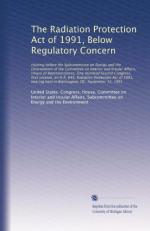|
This section contains 435 words (approx. 2 pages at 300 words per page) |

|
Ionizing radiation is any energy that causes the ionization of the substance through which it passes. As the radiation is emitted from a source, it detaches a charged particle from an atom or molecule, leaving the atom or molecule with an excess charge. This charged particle is called an ion.
To remove an electron from an atom or molecule, the ionizing particles must have a kinetic energy exceeding the binding energy of the target species, typically a few electron volts. (An electron volt is a unit of energy defined as the work it takes one electron to move across a voltage difference of one volt.) Radiation of sufficient energy for this process to occur is commonly produced in nature.
Some common ionizing charged species are electrons, positrons, protons, and a-particles (helium nuclei). Electrons, positrons, and a-particles are emitted by radioactive elements. Photons, the uncharged particles of...
|
This section contains 435 words (approx. 2 pages at 300 words per page) |

|


